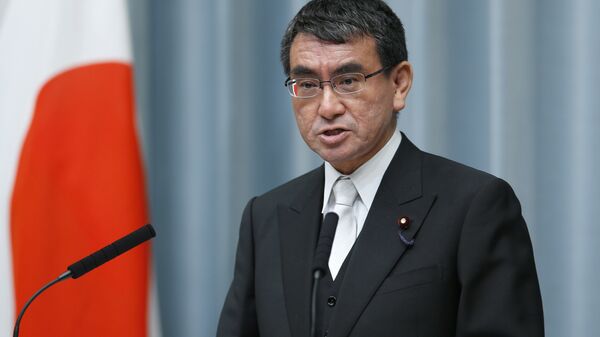TOKYO (Sputnik) – The relationship between Russia and Japan is abnormal, due to the fact that despite 70 years having passed since the end of the Second World War, a peace treaty has not been signed, according to Japanese Foreign Minister Taro Kono.
"The Japan-Russia relations have unlimited potential … If these hidden forces are released, Japan and Russia will establish truly strategic relations, it will benefit not only the Asia-Pacific region, but the entire international community in general," Kono said.
The Minister called on the people of both countries to resolve the peace treaty issue and cooperate so that their “dreams will flourish.”
He noted that in this regard, the projects of joint economic activities on the four disputed Kuril Islands — Iturup, Kunashir, Shikotan and Habomai – were of particular importance.
READ MORE: Russia Seeks Good Relations With Both China, Japan
“The fact that the Japanese and Russian people picture the future of the four islands together is contributing to the strengthening of mutual understanding and trust. I am determined that this will become a large contribution to signing the peace treaty. I would like to find a breakthrough solution to the peace treaty issue within the framework of the ‘new approach,’ which expresses future-oriented ideas,” Kono stressed.
Economic Ties
According to the minister, the two countries have previously elaborated projects of joint economic activities in five areas which would not damage the positions of both countries – namely aquaculture, greenhouse farming, tourism, wind power and waste reduction.
“In late October, in order to make these projects more concrete, the second trip [of the Japanese delegation] to examine the situation on the field has taken place. More than 50 experts sent by the government and businesses have visited the islands and examined different objects with the local residents. This has never happened before. Each of these projects is expected to improve the living standards of the islands’ residents with the use of the Japanese and Russian expertise, and boost humanitarian exchanges,” Kono said.
The Minister said that he intended to promote the implementation of the eight-point cooperation plan, which had been proposed by Japanese Prime Minister Shinzo Abe to Russian President Vladimir Putin during their meeting in May 2016. Kono noted that the plan would improve the living standards of Russian citizens with the use of Japanese technologies and expertise, and “bring Russia and Japan truly win-win relations.”
“In particular, we would like to turn the Far East region, which is geographically close to Japan, into the basis for enhancing Russian exports, to jointly develop agriculture, forestry and fishing, and to improve infrastructure. During the upcoming visit to Russia, I would like to speed up this process, in particular through the meeting of the intergovernmental commission on trade and economic issues, which is co-chaired by me and Russian First Deputy Prime Minister Igor Shuvalov,” the Minister said.
North Korea Issue
Japan should maintain close cooperation with Russia, as well as with the rest of the international community in order to achieve the de-nuclearization of the Korean peninsula amid Pyongyang’s repeated nuclear and missile tests, Taro Kono said.
He stressed that the North’s launches of missiles that flew over Japan, as well as nuclear tests, posed an “unprecedented threat” to the entire global community, including Japan and Russia, which is “completely unacceptable.”
“I believe that Japan should increase pressure on North Korea to its limits through cooperation with Russia and the entire international community, using various means to change its [Pyongyang’s] policy,” Kono said.
The Minister also noted that Russia’s role in issues related to the North Korean missile and nuclear threat was very important.
“The role of Russia as a permanent member of the UN Security Council and a member of the six-party talks [on Korean peninsula denuclearization] is very important,” Kono stressed.
Russian-Japanese relations have long been complicated by the fact that the two nations have never signed a permanent peace treaty after the end of World War II. No deal was reached due to a disagreement over a group of four islands claimed by both countries, collectively referred to as the south Kuril Islands by Russia and as the Northern Territories by Japan.


